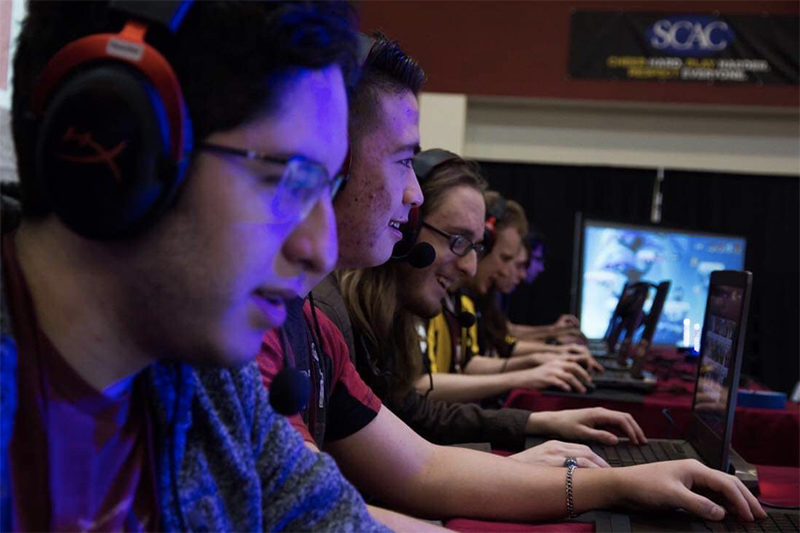Competitive Esports Burgeoning Among Small Texas Colleges
By Jack Keyes
Reporting Texas

Players from the Schreiner University esports team participating in the Southern Collegiate Athletic Conference’s inaugural esports showdown in April. The showcase featured five other colleges, with Colorado College ultimately earning the tournament title. Jack Keyes/Reporting Texas
When Concordia University was looking at ways to increase enrollment at the private Austin college last fall, the administration considered adding several sports, including a football team. At one meeting, the athletic director mentioned esports. Marc Valdoria, then an inbound content specialist for the school, recalls the room bursting into laughter over the suggestion.
“The program kind of started out as a joke,” Valdoria said.
After the school considered that an esports program would cost under $100,000 compared to around $1 million for a football team, the administration stopped laughing. Concordia will start a varsity esports program in the fall, and Valdoria, who has a passion for online gaming, will coach the team.
Esports follows the traditional sports model of teams, players and coaches, but it focuses on online gaming rather than physical prowess. Teams of as many as 30 players face off in a host of online multiplayer titles, including team-based battle game League of Legends and first-person shooter Overwatch. The sport is projected to top $1 billion in revenue globally by the end of the year, and there are dedicated and rabid supporters of top teams. Arlington houses the largest esports stadium in North America with a 1,000-person capacity, and it sold out its inaugural tournament in November.
While Friday night lights still overshadow the glow of computer screens in the Lone Star State, seven Texas universities will have varsity esports programs by next fall.
Yet, the schools leading the charge are not traditional sports powerhouses like University of Texas at Austin or Texas A&M. Five of Texas’ seven varsity esports programs — Schreiner University, Texas Wesleyan University, Jarvis Christian University and upcoming programs at Concordia University and McMurry University — have an undergraduate enrollment of under 3,000 students (University of North Texas and UT-Dallas are the other two varsity Texas esports programs).
So why do esports programs attract smaller schools in Texas, rather than universities that have more capital to fund teams?
Schreiner University in Kerrville founded its esports program in fall 2018 as part of an initiative to spark enrollment growth. In fall 2017, Schreiner had an enrollment of 1,312 and a graduation rate of 43 percent.
“Game culture is a way we can reach out to a wide range of prospective students and keep them engaged during their time with us,” Schreiner esports coach Brad Shearhart said. Shearhart notes that having an esports practice facility gives students a “headquarters” where they can collaborate on school projects in addition to practicing their gaming skills.
Though any Schreiner student can try out for the team, the school has offered as much as $40,000 in scholarship money to high school esports recruits. The school had 42 players listed on its fall 2018 roster.
Daniel Turgeon is a junior at Schreiner on a $40,000 esports scholarship. A top 300 player in North America at the game League of Legends, he picked Schreiner for the competitive gaming environment and says he probably would not be at the school if not for the team.
“I was a Pro League player prior to being here, so I decided to pursue education since the opportunity presented itself,” Turgeon said.
Sam Ferguson, the athletic director for McMurry University, says that in addition to improving enrollment, esports can provide academic benefits for the school when its program launches next fall. McMurry’s decision to enter varsity esports came after the administration found that esports players have average GPAs of over 3.0 and that many esports players enter STEM fields, which McMurry specializes in.
For McMurry, a school with just over 1,000 students and a graduation rate of only 36 percent, being able to recruit even a handful of high-achieving students through esports could pay dividends for the academic profile of the school.
“It is our hope to have built our program to a roster size of 30 or more students who are contributing positively to our campus culture, while also achieving academic excellence,” McMurry said. “These are very good students, generally speaking.”
An added benefit of esports for small schools is that computer gaming does not require expensive travel, since players can face off against other schools remotely. According to the National Association of Collegiate Esports, the average start-up cost of a college team is about $40,000.
Ferguson says less travel also means participants miss fewer classes.
There is no guarantee the esports boom will continue, so investing in esports are a risk that larger schools who have an institutional image to uphold may not want to take.
“Honestly, from what I see, most larger institutions wanted smaller ones to essentially be the guinea pigs so to speak,” National Association of College Esports head of marketing Victoria Horsley said. “For some [larger] schools, they want to make sure that esports is legitimate and sustainable before jumping in.”
Smaller schools that need academic help, however, can use esports to attract new, often academically gifted students at a low cost.
“For smaller institutions, esports is a way to drive recruitment and retention for their institution,” Horsley said. “Most small institutions see it as a better investment than beginning a new traditional sport program because of the return on investment potential.”
The result is a mutual symbiosis between these small, struggling colleges and students who want to be nurtured at a skill once seen as merely a time-wasting activity.
“Many students who would find it easy to stay in their rooms and keep to themselves have found friends and feel comfortable in the main social areas on campus,” Shearhart said. “A lot of gamers feel isolated, but the college experience is really bringing them together.”